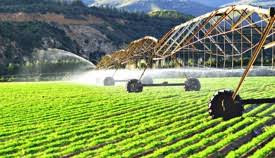Water is a crucial element in agriculture, and its efficient use is critical to the success of crops. Proper watering techniques ensure plants receive the necessary moisture to grow and produce healthy yields. Here is an article on proper watering techniques for agriculture.
An idea of sustainable farming
Sustainable farming, according to Benedict t palen Jr is a method
of agriculture that focuses on the long-term viability of the land, the environment,
and the community. It emphasizes using natural resources, such as water, soil,
and sunlight, to produce crops and livestock in an environmentally friendly and
socially responsible way. Sustainable farming also seeks to ensure that future
generations can continue enjoying these resources' benefits by promoting
conservation and biodiversity.
One of the most significant benefits of
sustainable farming is its impact on the environment. Traditional farming
practices often rely on chemical fertilizers, pesticides, and herbicides to
maintain crop yields, which can negatively affect soil health, water quality,
and biodiversity. Sustainable farming, on the other hand, uses techniques like
crop rotation, intercropping, and composting to maintain soil fertility, reduce
erosion, and promote healthy ecosystems.
Understand your soil
Soil type plays an essential role in
determining the watering frequency and volume. Sandy soils tend to dry out
faster and require more frequent watering, while clay soils retain moisture
longer and may need less frequent watering.
Use the right irrigation system.
Various irrigation systems are available,
including drip irrigation, overhead irrigation, and flood irrigation. Drip
irrigation is the most water-efficient and effective method for delivering
water to crops, while overhead irrigation can lead to water loss through
evaporation and runoff.
Water at the right time
The best time to water crops is in the
early morning at times you may do it the late afternoon when temperatures are cooler
and heat is less scorching. You must also remember to water on the hottest part
of the day, as the water tends to evaporate soon enough.
Water deeply and infrequently
It's essential to water crops deeply so
that the moisture reaches the roots. Watering too frequently but shallowly can
lead to the development of shallow roots, making the plants more susceptible to
drought.
Monitor soil moisture levels.
Use a moisture meter or probe to measure
soil moisture levels regularly. This will help you determine when and how much
to water your crops.
Don't overwater
Overwatering can lead to waterlogging,
which can suffocate plant roots and cause them to rot. It can also lead to
nutrient loss as excess water washes away vital nutrients from the soil.
In conclusion

No comments:
Post a Comment